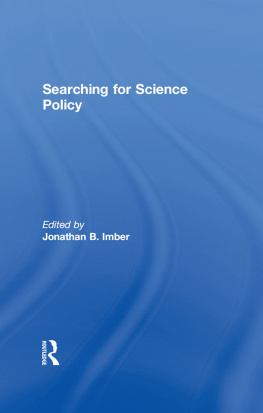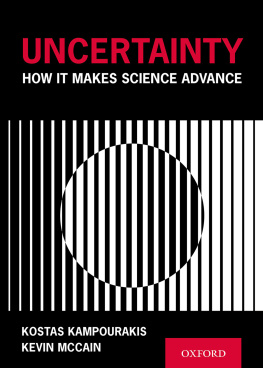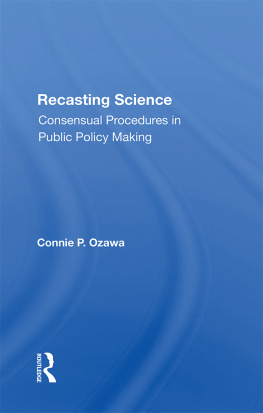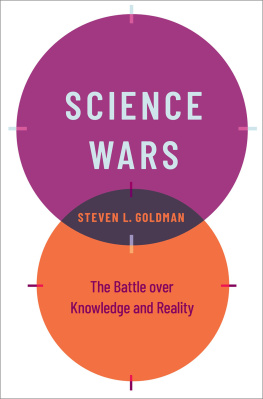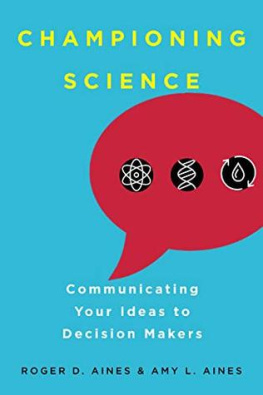First published 2002 by Transaction Publishers
Published 2017 by Routledge
2 Park Square, Milton Park, Abingdon, Oxon OX14 4RN
711 Third Avenue, New York, NY 10017, USA
Routledge is an imprint of the Taylor & Francis Group, an informa business
Copyright 2002 by Taylor & Francis.
All rights reserved. No part of this book may be reprinted or reproduced or utilised in any form or by any electronic, mechanical, or other means, now known or hereafter invented, including photocopying and recording, or in any information storage or retrieval system, without permission in writing from the publishers.
Notice:
Product or corporate names may be trademarks or registered trademarks, and are used only for identification and explanation without intent to infringe.
Library of Congress Catalog Number: 2002028928
Library of Congress Cataloging-in-Publication Data
Searching for science policy / Jonathan B. Imber, editor.
p. cm.
The chapters of this volume origniated in a conference entitled The use and misuses of science in public discourse held at Boston University on April 1 and 2, 2000Introd.
Includes bibliographical references and index.
ISBN 0-7658-0163-9 (alk. paper)
1. Policy sciencesCongresses. 2. Science and stateCongresses. 3. Social policyCongresses. I. Imber, Jonathan B., 1952-
H97 .S4 2002
320.6dc21
2002028928
ISBN 13: 978-0-7658-0163-0 (hbk)
Jonathan B. Imber
The chapters in this volume originated in a conference entitled The Uses and Misuses of Science in Public Discourse held at Boston University on April 1 and 2, 2000, under the auspices of the Institute for the Study of Economic Culture, in collaboration with Society, and with the generous support of the Lynde and Harry Bradley Foundation. I am personally grateful to Peter Berger for his vision of constructive social science and for his support in making the conference an important occasion to reflect on the broader meanings of science in society. Scientific research and the findings of such research ought to provide an important base line to the formulation of public policy in all sectors of society. Government, business, and universities are producers, consumers, and often arbiters of scientific research and findings. In assessing the uses and misuses of science, particularly in public discourse, the chapters contained here offer innovative ways of thinking about how the rhetoric and practice of science operate in various institutional contexts.
The communication to the larger public of what scientists do and know is a problem inherent to all democratic societies. It should not be seen as a kind of problem which is resolved by either limiting communication or delimiting the democratic process. Nevertheless, communicating complicated scientific findings to a jury or to an anxious public is fraught with difficulties that these essays seek to describe and clarify. Scientific truth cannot be put to a vote, even though it has been one prerogative of democratic societies to determine what kind of scientific research is funded, based upon the expectations of scientists themselves. It is often a complex and complicated matter.
The late Edward Shils, who taught sociology at the University of Chicago for forty years, wrote in 1987, Scientists have become part of the political public in a way in which they have never been before. In a personal account of the role that scientists played in the aftermath of the creation of the atomic bomb, he noted that the Cold War created a climate in which scientists, who recognized the fundamental truths about nature which they were unlocking, were viewed as unreliable. Shils explained that no one country could prevent another country from rediscovering the fundamental truths already discovered by other scientists and that the scientists themselves believed this very much. The unreliability of scientists in the age of Cold War secrecy was thus less about their political affiliations and more about what the internet has lately taught us again: lies may abound and be difficult to correct, but fundamental truths are also difficult to keep secret.
Yet as Shils presciently observed, The alarm about environmental damage resulting from the negligent disposal of chemical waste, the contention about the disposal of nuclear waste, the new sensitivity to dangers from pharmaceutical substances, anxiety about the potentialities of molecular biology and the technology based on it, and a deep fear of the destruction of human life by nuclear warfare have generated a tendency toward an anti-science attitude in the intellectual classes and more widely. Our skepticism about science is less about the concealment of its fundamental truths among nations and much more about the determination of its uses within and beyond them. There are reasons to be wary of too much of an anti-science attitude, especially in universities. I am not referring to the fiascoes about postmodernists who believe that gravity is a social construction but rather about how citizenship in democratic societies is affected, and I believe deeply affected, by the rush to judgment that is too often cloaked in scientific claims.
Policy Uses and Misuses of Science
In , four chapters are devoted to the question of the ways in which scientific claims themselves are inevitably mediated by their uses in various institutional spheres. Joel Best shows how the motivations to use inaccurate and misleading numbers stems directly from the ideological and institutional interests of those using them. Numbers are a substitute for authority in situations where ideological requirements demand that any principled disagreements about how to address a problem must be subordinated to the urgency of the problem itself. In this way, the most grotesque examples of such claims, for example, the stranger abduction of enormous numbers of children a year, prey upon the anxieties of parents with young children, guaranteeing that these anxieties will help garner attention for those peddling such nonsense. Nothing could be simpler and more publicly dynamic than the use of bad statistics for allegedly noble goals. The enduring problem is that the real frequency of problems, however defined, are not communicated. Instead, the unreal frequency of problems prompts attention and drives resources in directions that allow for little verification of or debate about the facts available.
Verification is one of the central problems of scientific advance, and it is not surprising that even among scientists themselves, the grounds for verification are often in dispute. As Judith Kleinfeld explains, the efforts to set policy among university faculty are driven by extra-scientific factors, and this is, presumably, how it should and inevitably must be. Yet precisely under the cloak of scientific justification, the changes in policy adopted by MIT with respect to its women scientists were defended as legitimate and necessary. Kleinfeld explains that this could not possibly be the case if fact-finding is the basis to policy recommendation because MIT officials refused to allow public scrutiny of the evidence cited to justify its actions. My impression is that Kleinfeld is not objecting in any way to MITs internal decisions about its prerogative to reward its faculty as it sees fit, but she finds the public justifications for doing so, based on alleged scientific evidence, not only disconcerting but undermining of the core values of the university itself. Verification is a principle of scientific integrity, and by claiming to use the equivalent of scientific findings for its policy decisions, one of the great schools of science diminished its

